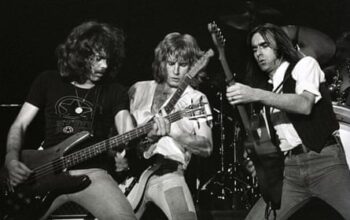The two cliches used to describe the new release by a major star are that it’s long-awaited and eagerly anticipated. You could hardly describe Taylor Swift’s 11th studio album as long-awaited – it’s barely 18 months since her last album, Midnights, a blink of an eye in the release schedule of a pop superstar. She’s also put out another three hours of music in the interim, in the shape of bonus track-packed re-recordings of 2010’s Speak Now and 2014’s 1989. But The Tortured Poets Department is certainly eagerly anticipated. The torrential nature of Swift’s output is one reason behind her current position as not just pop’s biggest star, but a figure who dominates pop culture to such a preposterous degree you struggle for a historical comparison: we live in a world where her endorsement of a candidate is considered a potentially deciding factor in the US presidential elections and where the prime minister of Singapore is embroiled in a row with his Thai counterpart over exclusivity rights to the south-east Asian leg of Swift’s Eras tour.

Among the countless other factors in her rise to omnipresence – her keen understanding of today’s altered media landscape and a desire for collective experience in a music world obsessed with individualised experiences – is, of course, her music, which can dim in comparison to the media noise. That’s a shame, because, as The Tortured Poets Department underlines, Swift is an authentically skilled songwriter: melodically gifted, thoughtful, witty and willing to take risks in a risk-averse era for pop.
The latter point is highlighted by the fact that the album patently isn’t designed to be the kind of all-conquering victory lap you might expect from an artist in Swift’s position. Its sound, co-produced by Jack Antonoff and the National’s Aaron Dessner, splits the difference between the glossy 80s-influenced pop-rock of 1989 and the small-hours understatement of Midnights, softening the former’s neon hues. The simple pulsing synth basslines and subtle electronics of Fortnight and Down Bad vaguely recall College’s A Real Hero, the downbeat highlight of the soundtrack to 2011’s Drive. It occasionally nods towards Swift’s Nashville past: the shivering wisps of slide guitar on I Can Fix Him (No Really I Can), a fiddle buried deep in the mix of But Daddy I Love Him. There are plenty of beautiful tunes, but it doesn’t bother with a huge statement banger, settling instead for a mood of etiolated melancholy. The guest appearances are impressively low key given the personnel: a man who released an album called Beerbongs & Bentleys, Post Malone is not an artist noted for his subtlety, yet barely troubles Fortnight, while on Florida!!! even Florence Welch has been required to dial it down a little.
The latter contains one of the album’s scant handful of big choruses, powered by thumping drums and blasts of synth. More often, Swift deals in subtle details, or songs that don’t go where you expect them to. Fresh Out the Slammer’s rhythm unexpectedly lurches into a heartbeat-like pulse midway through. So Long, London sets out its stall with a pacy four-four house beat, but it builds to a climax that never actually comes, mirroring the arc of the doomed relationship it describes.
Which brings us to the lyrics. Less cluttered and more conversational than those on Midnights, they return Swift to what you might call her safe space, letting a well-known ex have it in no uncertain terms. While So Long, London appears to hymn the end of her six-year relationship to actor Joe Alwyn, the album primarily puts a shorter-lived ex in the firing line: tattooed unpopular with her fans, erratic, given to public statements cooler heads might think twice about, the figure animating many of these songs is evidently Matty Healy of the 1975, with whom Swift had a short-lived dalliance last year. But if we’ve been here before, it’s still hard not to be impressed by Swift’s efficiency and wit – “Oh, here we go again, the voices in his head,” opens My Boy Only Breaks His Favourite Toys, one of a number of lines that you imagine accompanied by a roll of the eyes – or her ability to turn a celebrity boyfriend into a relatable archetype: everyone knows, or has known, someone a bit like the poser depicted in the title track or The Smallest Man Who Ever Lived.
after newsletter promotion
Elsewhere, anyone who thinks the world has currently taken leave of its senses where Taylor Swift is concerned might note the regular suggestion that Swift thinks so too, or at least that she’s profoundly uncomfortable with the prurience her level of celebrity commands. She variously compares fame to an asylum, a circus, a gallows and a lock she dreams of cracking: “I forget if this was ever fun,” she notes dolefully at one point. I Can Do It With a Broken Heart reads like a gushing review of her record-breaking Eras tour – “There in her glittering prime/ the lights refract sequinned stars off her silhouette” – before she darkly adds “I can tell you lies”, and admits to being profoundly depressed on its initial run. She ends the song by crying, in a mock-gleeful tone, “I’m so miserable! And nobody even knows!” Tellingly, she reserves the album’s most straightforwardly anthemic tunes for lyrics that attack the chatter about who she should date or how she’s supposed to behave: “I’d rather burn my whole life down than listen to one more second of this bitching and moaning,” protests But Daddy I Love Him. “All the wine moms are still holding out but fuck ’em.”
If you wanted to pick holes, The Tortured Poets Department is a shade too long; the synth glitter of I Can Do It With a Broken Heart is less interesting than the lyrics it supports; you could argue that this stuff protesting her fans attempting to control her private life is the unintended consequence of minting a style of songwriting that basically invites speculation about her private life. That said, those lyrics are as well-turned as the pen-portraits of her ex. The central conceit of But Daddy I Love Him (“but I’m having his baby! / No I’m not – but you should see your faces!”) is genuinely funny, their tone of fatigued exasperation both believable and affecting. There’s clearly a risk involved in calling out elements of your own fanbase, however justified said attack is, but Swift pulls it off.
She can do it because she’s an exceptionally talented writer: there’s a depth and maturity to this album that makes her competitors look a little wan by comparison. Clearly, the monocultural ubiquity she’s achieved isn’t terribly healthy for anything other than her bank balance – The Tortured Poets Department seems to concur – but if we have to have a single artist dominating pop, we could have picked worse.
Source: theguardian.com


